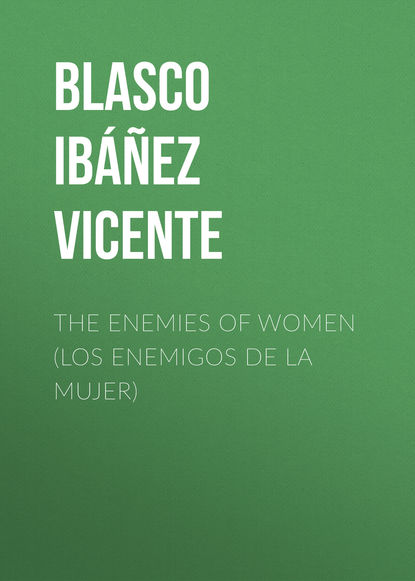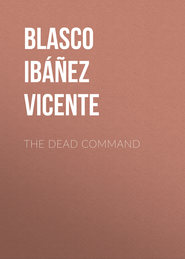По всем вопросам обращайтесь на: info@litportal.ru
(©) 2003-2024.
✖
The Enemies of Women (Los enemigos de la mujer)
Настройки чтения
Размер шрифта
Высота строк
Поля
Lubimoff suddenly saw in his eyes an expression like that of Spadoni's. He, too, knew what had happened, and in speaking of love immediately recalled that absurd duel. But Novoa was a different person, incapable of feeling the malign pleasure of gossips, who rejoice in other people's shortcomings. Besides, Michael felt that he was very frank, and was immediately convinced of this. Quietly, without thinking whether or not his words might annoy the other man, the Professor alluded to what had occurred at Lewis' castle. He lamented it as something illogical and untimely, but had not ceased to be interested in the affairs of the Prince on that account. If he had refrained from going to Villa Sirena, it was in order not to seem forward. He had often talked with the Colonel, asking him to take his best wishes to the Prince.
Then, as though repenting the severity with which he had judged the duel, he hastened to explain. The image of Castro passed through his mind, causing him to look at his comrade with brotherly tolerance.
"I can understand a great many things. I am not a fighting man like you, and nevertheless, I once felt a desire to fight. At present I laugh when I think of it; but, in similar circumstances, I would do the same again. What power women have over us! How they change us!"
The Prince did not protest on hearing that Novoa supposed him to be in love, attributing the duel to a woman's influence. And he continued to remain silent, while the Professor, through a logical association of ideas, began to talk about Alicia. The kindly simple savant showed a keen satisfaction in telling certain news which he thought would please Lubimoff.
He felt a similar interest in his compatriot, Martinez. He did not hate any one. He had even forgotten the disagreements with Castro, which had caused him to leave the comfort and plenty of Villa Sirena.
"That poor Lieutenant is less fortunate than you, Prince: this duel has been rather hard on him. I enjoy a certain intimacy with people who are close to the Duchess de Delille… I do not need to say any more: you understand that I am in a position to know what is going on in the Villa Rosa. Well, then; since the duel, I don't know what has happened, but Martinez calls at that house less frequently. Whole days go by without his daring to ring at the door. Sometimes he goes there, and a person whom you know tells me that the Duchess refuses to see him. At present he is a mere visitor, a friend like any other. The Duchess is anxious to avoid their former intimacy; she continues to send him little gifts at the Officers' Hotel, and to look after his comfort. She sends the young lady who is a friend of mine to find out if he needs anything, but she receives him only at rare intervals. The lunches and dinners each day have come to an end, with that life in common, which would have been complete if he had slept in the house. And the poor boy seems sad, and full of despair at this change."
The Professor was encouraged in his confidences on noting the pleasure with which the Prince received them.
"A certain person," he continued, after some hesitation, "who has spent several nights in the street where the Duchess lives – the deuce, a certain person! Why shouldn't I tell the whole truth – I, who sometimes spend hours in the neighborhood of Villa Rosa, waiting for the young lady in question, have surprised Martinez near the house, slinking by close to the gate, looking at the windows. Poor boy! And they tell me that during the day time, when he is afraid that the Duchess won't receive him, he goes by there, just the same."
Lubimoff was stirred by a double feeling: one of rage, at the conviction that he had made no mistake: that little soldier boy was in love with Alicia; and one of delight on learning that he was not received in the house, as before, and was hovering about the neighborhood in vain. It was a negative sort of joy for him, but joy at any event, to see that youth in a situation like his own.
Novoa, being a man of simple tastes, could not understand love except under conventional circumstances, and between people of similar ages; and he laughed at this passion of the officer, as though it were something exceedingly amusing.
"How absurd! To fall in love like that with a woman old enough to be his mother!"
The Prince started on hearing this, looking fixedly at his companion. No; the Professor had discovered nothing. He was laughing at his own reflections, without any indirect insinuations. No one but Lubimoff himself could possibly know Alicia's real secret.
They walked back and forth several times between the cannon and the trees. Suddenly, the bells of the churches and convents in Monaco, began to ring, answering, through the luminous atmosphere, those of the Monte Carlo frontier.
Twelve o'clock! Novoa became restless. He was a man of fixed habits, and besides, the Monaco people at whose house he was living were absolutely punctual in their meal hours. To think that there was not a restaurant in Monaco, where for once he could be extravagant and invite the Prince! The latter proposed that he accompany him to the far-off Villa Sirena to lunch together. It was so pleasant to be in his company! He gave him such interesting news!
"Impossible!" the Professor hastened to say. "I must see some one in Monte Carlo as soon as I finish my lunch. They will wait for me."
And the Prince did not insist, guessing that the person referred to was Valeria.
A single carriage had taken refuge in the pale shade of the trees. It had remained there after bringing some tourists who, on coming out of the Museum, preferred to return on foot by the ancient path along the fortifications.
Michael got into it, and drove to Villa Sirena.
The rest of the day and a great part of the night passed very pleasantly for him. He was going over and over in his memory the news he had just heard. It had not been a bad day. He scarcely remembered Castro. Castro was in Paris; that was the one thing certain. On the other hand, the misfortune of Martinez made him hum gaily to himself, and this unusual good humor quite deceived the Colonel.
"All I say is, Your Highness ought to go out, and see people. I was sure that to-day's walk would do you a world of good."
The following day, the Prince had an even pleasanter surprise. He had finished his lunch, when his valet announced ceremoniously: "Dr. Novoa, the professor, to see you, sir."
Michael, having a presentiment that it meant something very interesting for him, received the Spaniard with extraordinary effusion, such as Toledo had never seen before. "Awfully good of you to come, Novoa! You don't mean to say you have had your lunch already? What a regular life you Monaco bachelors lead! Well, at least, you'll have coffee with me?"
And the Prince hastily finished his lunch and went into the salon, where coffee and liqueurs were waiting. The impatience of the visitor to talk with him privately was so obvious, that Lubimoff hastened to invent an excuse for Don Marcos to go away.
When they were alone, Novoa left his cup on the little table, took several puffs at his cigar, as though to summon all his strength of will, and finally said in a resolute voice:
"I have a message to give you: a certain person sent me here … and I suspect that I am playing a rather cheap rôle. A man like myself doing such errands as this!.. Besides, men ought to help one another. You who are a real gentleman, may perhaps consent to do something for me…"
And the good Professor talked as though he felt himself united with the Prince by a sort of professional comradeship, by being in the same condition.
Lubimoff, anxious to know the message, gave a look of acquiescence. Yes: it was true; he was capable of doing anything for him that he might ask. At that moment he felt the savant his best friend. But what was the message?
Novoa continued, with a certain hesitation. The day before, after his meeting with the Prince, he had seen that young lady … that young lady who is a companion to the Duchess. He had told her everything; a bad habit he had, but lovers cannot always talk about themselves.
"We were together at a concert, and this morning she came to the Museum to tell me to see you immediately. I refused at first to take the message, but you know what women are. Besides, the young woman has a mind of her own. To make it short, here I am repeating what I was told."
He was silent for a moment, and after looking all around, he added, in a mysterious voice:
"This afternoon, at St. Charles."
On his way there Novoa had been worried by the obscurity of the message. What St. Charles was it? A hotel? A promenade? As a resident of Monaco, the Professor knew only the Casino in Monte Carlo. The one thing certain in his mind was that Valeria's message came from the Duchess.
Michael made an effort to hide the joy which these words gave him. Alicia was looking for him! In spite of his satisfaction he felt a need of asking for fresh details. Hadn't Novoa been told the time?
"No, Prince. 'This afternoon, at St. Charles'; not another word more. The young lady almost became angry because I asked her to make it clearer. I told you that when we are by ourselves she can be cross – like all the rest. She told me that you would understand the message at once."
Lubimoff nodded in affirmation; yes, he understood. What a nice fellow the scientist was! At that moment he wished him every sort of happiness that men can enjoy. If he had not known Novoa's scruples and his pride, he would have asked Don Marcos for all the money there was in the house, to hand it to him in handfuls. But since a material gift was quite out of the question, he expressed the hope that Valeria, whom he had always considered an ambitious climber, would bring happiness and beauty into the Professor's life. His satisfaction made him so optimistic that he even believed that he had been mistaken in regard to her, and he endowed the Duchess' companion with a great number of hidden virtues.
Toledo had returned, and the Prince, who wanted to please Novoa, talked to him about Oceanographic explorations, displaying a lively curiosity in his questions, though his thoughts were far away.
But this attempt at flattery was wasted. The Professor replied to his questions with hesitation. He was in a hurry; some one was waiting for him … doubtless Valeria needed to know the result of his errand at once. And the Prince also displayed a certain haste in accompanying him to the gate, with the greatest possible show of friendliness. He must return often to Villa Sirena; he was his one real friend. What a pity he refused to live there, as he had formerly!
When Lubimoff found himself alone, he went upstairs to his rooms on the second floor. He was afraid the Colonel would guess the cause of his satisfaction. A sensation of pride and triumph mingled now with the joy of the first moment.
He thought of his situation, Don Marcos had remained silent since the duel, and he, himself, a prey to loneliness, had been in the depths of despair, imagining himself the laughing-stock of every one.
Now he could see things clearly, Alicia wanted to come back to him. She had fallen in love with him again. Everything showed that: the Lieutenant practically expelled from the house, which two weeks before he had considered as his own; and his former protectress avoiding him, so that his visits were becoming rare. Doubtless, on learning through Valeria that her former lover had voluntarily left his retirement in Villa Sirena, she was hastening to make an immediate appointment with him in haste to resume their former relations.
He congratulated himself on his unexplainable aggressiveness which had impelled him to offend Martinez. He, who, in the last few days had repented of that mad affair! What had weighed upon him like remorse, was perhaps the most sensible and opportune act of his life. Alicia, seeing that, mad with jealousy, he was doing something which many people considered absurd, fighting for her sake, doubtless felt flattered in her vanity, and was looking upon him now with new interest.
"Oh, these women!" thought Lubimoff. "You've got to know them. They have an instinctive admiration for the strong. There is nothing like an act of brutality at the right moment to conquer them. They take a certain joy in yielding to a man who impresses them by violence."
This had been his first happy moment in many, many days. Once more he was the Prince Lubimoff who had always had his way, triumphing on obstacles, sometimes with his money, but more often with his imperious pride.
Satisfied with his rough strength, he felt the need of making himself handsome before keeping the engagement. He was thinking of the males of the animal kingdom, who in addition to teeth, claws, and spurs, have combs, manes, and plumage to fall back on when it comes to inspire a sort of mystic slavish admiration in the females. It was the same among human beings. Education, laws, and traditions do nothing but disguise the barbaric foundations of human nature.
His thoughts were interrupted by something which worried him. At what time should he appear at the place indicated. It occurred to him, that as no hour was mentioned, it must be the same as that of the previous meeting at the door of St. Charles. But he finally was convinced that the Professor had forgotten something, and his uneasiness made him keep the engagement much earlier.
He spent more than three hours waiting anxiously, wandering about the streets in the neighborhood of the church, standing motionless at the corners, and changing from one place to another on noticing the curiosity of the passersby. He entered St. Charles several times, and was always greeted by the same sight: the multi-colored stained glass windows growing paler and paler, as the daylight waned, the clusters of flags, the altar pieces breaking the shadow with the dull splendor of their gold background, and women kneeling and motionless; women who seemed the same as on the other occasion, as though weeks had been minutes.
With the superstitious feeling of those who wait, he said to himself that Alicia surely would not appear until nightfall, and the day seemed endless to him.
As night came on he began to doubt.
"She won't come. She must have repented."
He was standing on the corner of a curved and sloping street adjoining the church. From there he could observe the steps leading to the little square with the sunken boulevard. No one climbed them; all the carriages passed without stopping.















